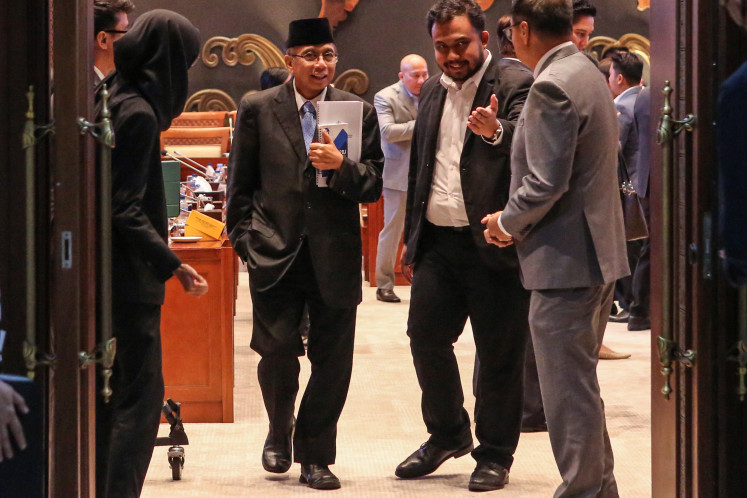Popular Reads
Top Results
Can't find what you're looking for?
View all search resultsPopular Reads
Top Results
Can't find what you're looking for?
View all search resultsThe rise & fall of startups
Best product: Tani Hub team presents their product at the pitching session
Change text size
Gift Premium Articles
to Anyone
B
span class="caption">Best product: Tani Hub team presents their product at the pitching session. The team won a free facility at the co-working space Conclave, South Jakarta, as the best product.
Easy come and easy go. It takes no time to build a tech startup, or for it to get off the market.
Sixty-five young people, some of them students, gathered in Jakarta during a weekend in early October to receive a short course on how to build a company in 54 hours.
By the end of the workshop, which was organized by micro business accelerator KIBAR, the 12 teams had their startups up and running.
Fadli Wilihandarwo, a medical student of Yogyakarta-based Gadjah Mada University, was one of them.
With Ryan Mahartomo and Fairwin Aksara he just met at the event they set up, Satu Kelas (One Class), a mobile application that will allow university students all over the country to share notes and in turn improve the quality of human resources.
'For the monetization, we charge users as much as a photocopy service fee per page while those who post and review lecture notes will be paid,' said Fadli, a computer geek who set up Pasienia, a social media platform for people suffering similar diseases to share tips and knowledge.
To scale up the business, according to Ryan, a staff member at the Finance Ministry, they might link the application with bookstores or publishers.
'It can grow big,' he said.
The mentors at the event, who specialized in business modelling, product design, financial management and business partnerships, guided the teams to build the startups from scratch.
'Some of the ideas are actually good, but we'll see how long it will stay in business,' said mentor Sofian Hadiwijaya, the co-founder of Crackerz ' also known as the Crazy Hackerz, a startup company that provides website management and design solutions.
The success stories of Google, Facebook, Twitter, and at home, Kaskus and Go-Jek, have sparked the rise of a horde of young people who set up their own companies in the hope they can sell something to a very large market.
These aspiring entrepreneurs ride on the wave of the Internet of Everything by providing services utilizing digital technologies.
The beginning: A team of participants formulates a business model for their startup.
To become a tech entrepreneur, one needs an idea that sells, a solid business concept and, for sure, an internet connection.
On paper, it doesn't need a lot of money to start and an expectation of fame and fortune doesn't go amiss.
But not everyone is Mark Zuckerberg and that reality hits hard.
Indonesia is no different. Although there was no official data on the number of startups since there was a boom a decade ago, only a handful of them still survive today.
Sofian has had it all.
At 26 he had experienced dealing with poor business planning, money lost, non-committal partners and even shady investors from his previous business ventures.
'Building a business and maintaining it is a survival game,' said Sofian, who often appeared at startup pitching events as either a judge or a mentor.
He said that most of the participants he encountered took a startup as their side job and were ready to let it go should it be financially exhausting or when an interested venture capitalist takes it over.
'When you want to become an entrepreneur, you have to be a full-time entrepreneur. There is no other way,' said Sofian who quit his studies at the Technology Industry department of Bina Nusantara University in Jakarta to be in the tech business.
'If you are setting up a company thinking of getting lucky and getting an investor even before you start, then you shouldn't start.'
Tech writer Aulia Masna corroborated the notion, saying that traditionally there were three financial backers for startups: family, friends and fools.
'Funding from angel investors is essential, but don't rush to pitch to venture capitalists unless you want to scale up. A good idea and a sustainable business model are the main keys to success,' said the owner of advertisement blog AdDiction.
He said that young startups could learn some valuable lessons from the dead ones archived in Autopsy.io or, for local names, in Masuk Gudang (Into the Attic) at magud.tumblr.com.
'It's important to stay relevant,' said Aulia, referring to the startup failures mostly caused by poor teamwork and bad planning.
While tech startups are seen nowadays as part of the new economy ' where internet-based retail, support services, information and mobile applications or security services are the drivers for economic development worldwide ' idealism is a must.
Hadikusuma Wahab, vice president of products with KMK Online, explained at the workshop about the paradox of product management, in which a product might lose its 'soul' when being handed to a professional manager, as is usually the case in business scaling.
'It is necessary for founders to be involved in review and validation of the key features of the product,' he said.
One thing about venture capital firms is that they tend to have a more active role in the company they are backing to ensure the return of investment that may include restructuring.
Other factors that make a tech startup different from the traditional business model, other than its tendency to rely on funding, is that it is designed to grow rapidly and that it requires an exit strategy.
'The common mistakes of founders are that they are thinking way ahead and spend too much at the beginning. Let's focus for the first two months and another short period after that. Break down the challenges,' said Hadikusuma.
The exit plan, according to Aulia, comes in various forms that included paying off investors, a buy-out or even taking loans.
'A buy-out is very common because it is considered the easiest, but then again it's in the mind of every founder to launch a startup in the stock market as the ideal goal.'
Team Fadli may dream big, but Ryan, who at the ministry works within the state auction directorate, has more options.
'I'm here to know more about startups because I need a distraction from my job, but talking to the mentors here, they advised me to instead make some changes at government institutions, such as digitalizing the work system.'
____________________________________
To receive comprehensive and earlier access to The Jakarta Post print edition, please subscribe to our epaper through iOS' iTunes, Android's Google Play, Blackberry World or Microsoft's Windows Store. Subscription includes free daily editions of The Nation, The Star Malaysia, the Philippine Daily Inquirer and Asia News.
For print subscription, please contact our call center at (+6221) 5360014 or subscription@thejakartapost.com











